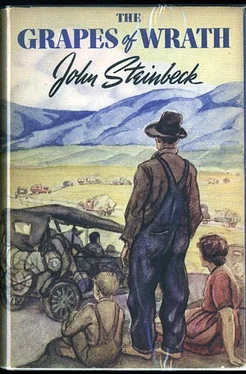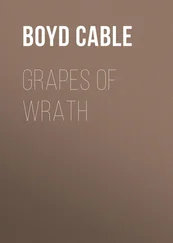John Steinbeck - The Grapes of Wrath
Здесь есть возможность читать онлайн «John Steinbeck - The Grapes of Wrath» весь текст электронной книги совершенно бесплатно (целиком полную версию без сокращений). В некоторых случаях можно слушать аудио, скачать через торрент в формате fb2 и присутствует краткое содержание. Город: New York, Год выпуска: 1939, Издательство: The Viking Press-James Lloyd, Жанр: Классическая проза, на английском языке. Описание произведения, (предисловие) а так же отзывы посетителей доступны на портале библиотеки ЛибКат.
- Название:The Grapes of Wrath
- Автор:
- Издательство:The Viking Press-James Lloyd
- Жанр:
- Год:1939
- Город:New York
- ISBN:нет данных
- Рейтинг книги:5 / 5. Голосов: 1
-
Избранное:Добавить в избранное
- Отзывы:
-
Ваша оценка:
- 100
- 1
- 2
- 3
- 4
- 5
The Grapes of Wrath: краткое содержание, описание и аннотация
Предлагаем к чтению аннотацию, описание, краткое содержание или предисловие (зависит от того, что написал сам автор книги «The Grapes of Wrath»). Если вы не нашли необходимую информацию о книге — напишите в комментариях, мы постараемся отыскать её.
The Grapes of Wrath — читать онлайн бесплатно полную книгу (весь текст) целиком
Ниже представлен текст книги, разбитый по страницам. Система сохранения места последней прочитанной страницы, позволяет с удобством читать онлайн бесплатно книгу «The Grapes of Wrath», без необходимости каждый раз заново искать на чём Вы остановились. Поставьте закладку, и сможете в любой момент перейти на страницу, на которой закончили чтение.
Интервал:
Закладка:
She looked out into the sunny yard, at the dark figure of a man. Pa stood near by, shaking with excitement. “Come in,” he cried. “Come right in, mister.” And Tom a little shamefacedly stepped over the doorsill.
She looked up pleasantly from the frying pan. And then her hand sank slowly to her side and the fork clattered to the wooden floor. Her eyes opened wide, and the pupils dilated. She breathed heavily through her open mouth. She closed her eyes. “Thank God,” she said. “Oh, thank God!” And suddenly her face was worried. “Tommy, you ain’t wanted? You didn’t bust loose?”
“No, Ma. Parole. I got the papers here.” He touched his breast.
She moved toward him lithely, soundlessly in her bare feet, and her face was full of wonder. Her small hand felt his arm, felt the soundness of his muscles. And then her fingers went up to his cheek as a blind man’s fingers might. And her joy was nearly like sorrow. Tom pulled his underlip between his teeth and bit it. Her eyes went wonderingly to his bitten lip, and she saw the little line of blood against his teeth and the trickle of blood down his lip. Then she knew, and her control came back, and her hand dropped. Her breath came out explosively. “Well!” she cried. “We come mighty near to goin’ without ya. An’ we was wonderin’ how in the worl’ you could ever find us.” She picked up the fork and combed the boiling grease and brought out a dark curl of crisp pork. And she set the pot of tumbling coffee on the back of the stove.
Old Tom giggled, “Fooled ya, huh, Ma? We aimed to fool ya, and we done it. Jus’ stood there like a hammered sheep. Wisht Grampa’d been here to see. Looked like somebody’d beat ya between the eyes with a sledge. Grampa would a whacked ’imself so hard he’d a throwed his hip out—like he done when he seen Al take a shot at that grea’ big airship the army got. Tommy, it come over one day, half a mile big, an’ Al gets the thirty-thirty and blazes away at her. Grampa yells, ’Don’t shoot no fledglin’s, Al; wait till a growed-up one goes over,’ an’ then he whacked ’imself an’ throwed his hip out.”
Ma chuckled and took down a heap of tin plates from a shelf. Tom asked, “Where is Grampa? I ain’t seen the ol’ devil.” Ma stacked the plates on the kitchen table and piled cups beside them. She said confidentially, “Oh, him an’ Granma sleeps in the barn. They got to get up so much in the night. They was stumblin’ over the little fellas.”
Pa broke in, “Yeah, ever’ night Grampa’d get mad. Tumble over Winfield, an’ Winfield’d yell, an’ Grampa’d get mad an’ wet his drawers, an’ that’d make him madder, an’ purty soon ever’body in the house’d be yellin’ their head off.” His words tumbled out between chuckles. “Oh, we had lively times. One night when ever’body was yellin’ an’ a-cussin’, your brother Al, he’s a smart aleck now, he says, ’Goddamn it, Grampa, why don’t you run off an’ be a pirate?’ Well, that made Grampa so goddamn mad he went for his gun. Al had ta sleep out in the fiel’ that night. But now Granma an’ Grampa both sleeps in the barn.”
Ma said, “They can jus’ get up an’ step outside when they feel like it. Pa, run on out an’ tell ’em Tommy’s home. Grampa’s a favorite of him.”
“A course,” said Pa. “I should of did it before.” He went out the door and crossed the yard, swinging his hands high.
Tom watched him go, and then his mother’s voice called his attention. She was pouring coffee. She did not look at him. “Tommy,” she said hesitantly, timidly.
“Yeah?” His timidity was set off by hers, a curious embarrassment.
Each one knew the other was shy, and became more shy in the knowledge.
“Tommy, I got to ask you—you ain’t mad?”
“Mad, Ma?”
“You ain’t poisoned mad? You don’t hate nobody? They didn’ do nothin’ in that jail to rot you out with crazy mad?”
He looked sidewise at her, studied her, and his eyes seemed to ask how she could know such things. “No-o-o,” he said. “I was for a little while. But I ain’t proud like some fellas. I let stuff run off’n me. What’s a matter, Ma?”
Now she was looking at him, her mouth open, as though to hear better, her eyes digging to know better. Her face looked for the answer that is always concealed in language. She said in confusion, “I knowed Purty Boy Floyd. I knowed his ma. They was good folks. He was full of hell, sure, like a good boy oughta be.” She paused and then her words poured out. “I don’ know all like this—but I know it. He done a little bad thing an’ they hurt ’im, caught ’im an’ hurt him so he was mad, an’ the nex’ bad thing he done was mad, an’ they hurt ’im again. An’ purty soon he was mean-mad. They shot at him like a varmint, an’ he shot back, an’ then they run him like a coyote, an’ him a-snappin’ an’ a-snarlin’, mean as a lobo. An’ he was mad. He wasn’t no boy or no man no more, he was jus’ a walkin’ chunk a mean-mad. But the folks that knowed him didn’t hurt ’im. He wasn’ mad at them. Finally they run him down an’ killed ’im. No matter how they say it in the paper how he was bad—that’s how it was.” She paused and licked her dry lips, and her whole face was an aching question. “I got to know, Tommy. Did they hurt you so much? Did they make you mad like that?”
Tom’s heavy lips were pulled right over his teeth. He looked down at his big flat hands. “No,” he said. “I ain’t like that.” He paused and studied the broken nails, which were ridged like clam shells. “All the time in stir I kep’ away from stuff like that. I ain’ so mad.”
She sighed, “Thank God!” under her breath.
He looked up quickly. “Ma, when I seen what they done to our house—”
She came near to him then, and stood close; and she said passionately, “Tommy, don’t you go fightin’ ’em alone. They’ll hunt you down like a coyote. Tommy, I got to thinkin’ an’ dreamin’ an’ wonderin’. They say there’s a hun’erd thousand of us shoved out. If we was all mad the same way, Tommy—they wouldn’t hunt nobody down—” She stopped.
Tommy, looking at her, gradually dropped his eyelids, until just a short glitter showed through his lashes. “Many folks feel that way?” he demanded.
“I don’t know. They’re jus’ kinda stunned. Walk aroun’ like they was half asleep.”
From outside and across the yard came an ancient creaking bleat. “Pu-raise Gawd fur vittory! Pu-raise Gawd fur vittory!”
Tom turned his head and grinned. “Granma finally heard I’m home. Ma,” he said, “you never was like this before!”
Her face hardened and her eyes grew cold. “I never had my house pushed over,” she said. “I never had my fambly stuck out on the road. I never had to sell—ever’thing—Here they come now.” She moved back to the stove and dumped the big pan of bulbous biscuits on two tin plates. She shook flour into the deep grease to make gravy, and her hand was white with flour. For a moment Tom watched her, and then he went to the door.
Across the yard came four people. Grampa was ahead, a lean, ragged, quick old man, jumping with quick steps and favoring his right leg—the side that came out of joint. He was buttoning his fly as he came, and his old hands were having trouble finding the buttons, for he had buttoned the top button into the second buttonhole, and that threw the whole sequence off. He wore dark ragged pants and a torn blue shirt, open all the way down, and showing long gray underwear, also unbuttoned. His lean white chest, fuzzed with white hair, was visible through the opening in his underwear. He gave up the fly and left it open and fumbled with the underwear buttons, then gave the whole thing up and hitched his brown suspenders. His was a lean excitable face with little bright eyes as evil as a frantic child’s eyes. A cantankerous, complaining, mischievous, laughing face. He fought and argued, told dirty stories. He was as lecherous as always. Vicious and cruel and impatient, like a frantic child, and the whole structure overlaid with amusement. He drank too much when he could get it, ate too much when it was there, talked too much all the time.
Читать дальшеИнтервал:
Закладка:
Похожие книги на «The Grapes of Wrath»
Представляем Вашему вниманию похожие книги на «The Grapes of Wrath» списком для выбора. Мы отобрали схожую по названию и смыслу литературу в надежде предоставить читателям больше вариантов отыскать новые, интересные, ещё непрочитанные произведения.
Обсуждение, отзывы о книге «The Grapes of Wrath» и просто собственные мнения читателей. Оставьте ваши комментарии, напишите, что Вы думаете о произведении, его смысле или главных героях. Укажите что конкретно понравилось, а что нет, и почему Вы так считаете.











